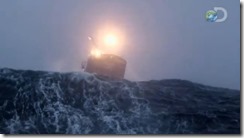Get a Grip
My regular source of entrepreneurial catharsis is watching Deadliest Catch.
If you've never seen it, it's a Discovery Channel show that follows four-six actual fishing vessels during two different Alaskan Crab fishing seasons a year (King and Snow.) “Bering Sea fisherman” is considered to be the most dangerous occupation in North America, hence the name.
Many of the crab boat captains are entrepreneurs themselves, being part or full owners of the boats. If the boat stops fishing, they go broke. If the boat breaks down, the fuel / parts / labor / time cost comes out of the crew and captain’s cut.
 The captains are constantly put into situations that your average tech entrepreneur can relate to: dealing with emergencies, constant HR issues, having to make strategic bets on incomplete data, the emotional rollercoaster, you name it. The viewer watches the captains struggle with these decisions in every episode, and it’s as much of the experience and drama as the harsh nature of the Bering Sea itself.
The captains are constantly put into situations that your average tech entrepreneur can relate to: dealing with emergencies, constant HR issues, having to make strategic bets on incomplete data, the emotional rollercoaster, you name it. The viewer watches the captains struggle with these decisions in every episode, and it’s as much of the experience and drama as the harsh nature of the Bering Sea itself.
What puts Deadliest Catch in perspective for me is this: people actually get maimed and even die on that show.
Boats get capsized by 60 foot rogue waves; deck-hands go overboard never to be found again during uneven seas; or get crushed by 1,200lb steel crab pots falling from a four-story tall stack. The fishermen’s lives, in addition to their livelihoods, are always at stake and are lost with regularity.
Back in the universe of technology entrepreneurship, the most danger I'm in everyday is getting carpal tunnel or eventually putting on weight due to poor diet and lack of exercise. No matter how hard things get, even if I fail epically, I’m not at risk of dying as a result of anything that can happen at any tech startup.
In one column: death, in another column: average health and with well above-average opportunities.
When I read maudlin stuff like today’s “The last day” short story on Pando Daily (with all due respect to Francisco Dao, a friend), I can’t really take it seriously.
I’ve failed a couple of times already in my short career thus far, including a big public flop in front of a number of my classmates when I was in college – and you know what?
You experience total humiliation and vulnerability when something you created falls apart, and that’s how you’re supposed to feel if you cared about what you did.
But dead startups aren’t things of life or death themselves – you’re not going to die; your stock will only rise as a result of what you did at your startup provided that you didn’t do anything unethical; most of your friends will admire you for having the balls to try something on your own in the first place; and you’re going to have a chance to try again.
It’s hard to ignore the self-critical things we all whisper to ourselves as entrepreneurs; they’re sometimes a healthy and necessary gut-check against reality, but more often than not they’re just self-destruction mistaken for self-motivation.
So don’t be so hard on yourselves and be the first in line to kick your own ass, because your market / customers / employees / investors / co-founders / competitors will all have plenty of chances to do it for you. Accept the occasional beating as an inevitability and recognize that the one thing you can always control is how you choose to react to things you cannot.
And now, I think it’s appropriate to share a little wisdom from Deadwood:
